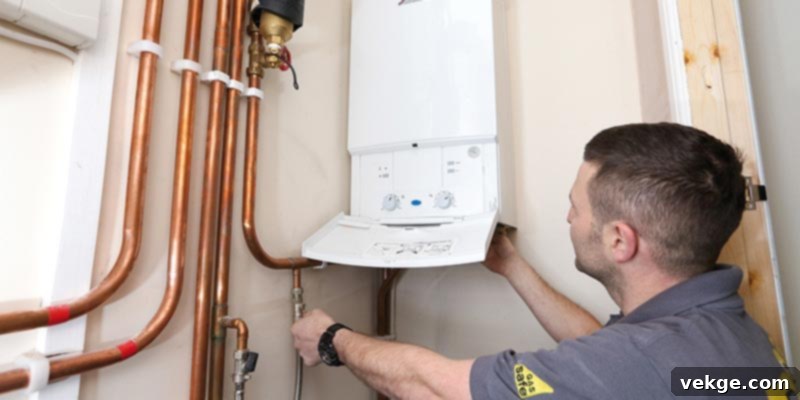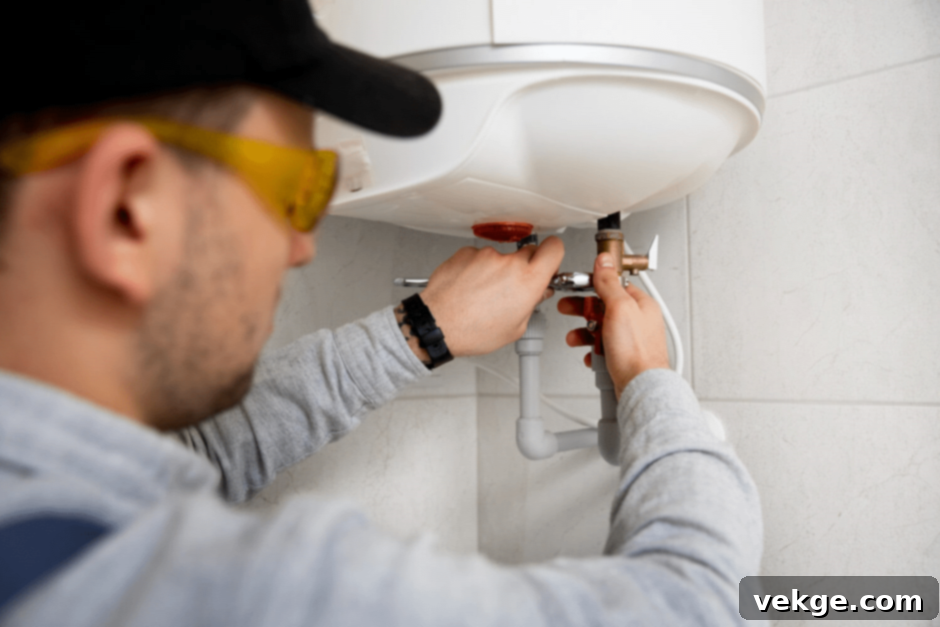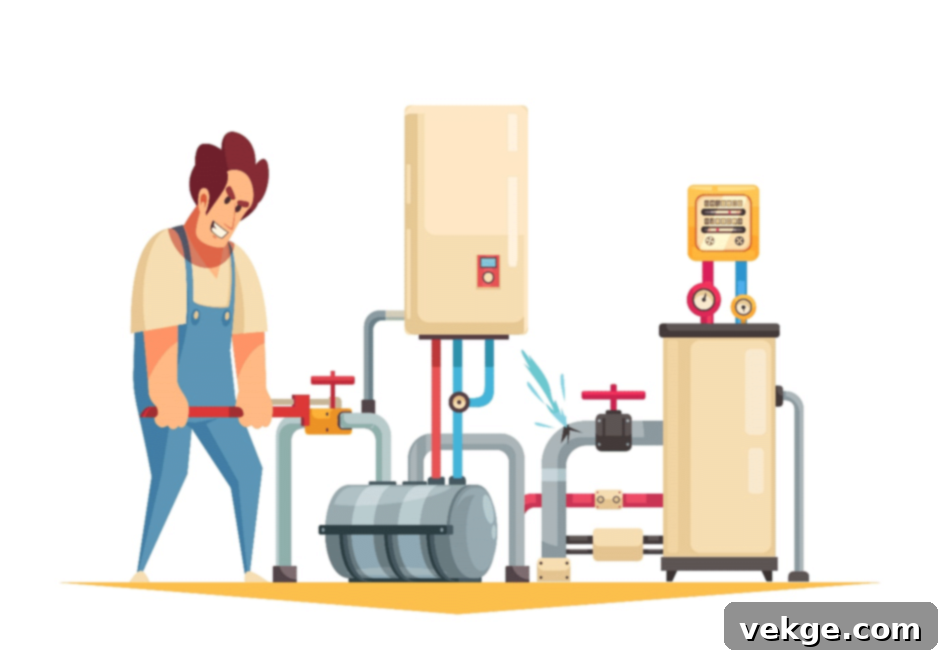Unlock Comfort & Savings: 5 Definitive Signs It’s Time to Replace Your Old Boiler
Is your home’s heating system struggling? Perhaps you’ve noticed a significant spike in your energy bills, constant disruptions due to breakdowns, or unusual sounds emanating from your boiler. These aren’t just minor inconveniences; they are often clear indicators that your boiler is nearing the end of its life and it might be time for a vital upgrade. Investing in a new, energy-efficient boiler is more than just a home improvement; it’s a strategic move to ensure your household remains warm, comfortable, and cost-effective, especially as the colder months approach.
This comprehensive guide delves into five critical signs that signal it’s time to replace your boiler. We’ll explore the underlying issues, the benefits of modern heating solutions, and what to consider when making this important decision. Don’t wait for a complete system failure to act; understanding these signs now can save you significant money, stress, and discomfort in the long run. Let’s explore how to make an informed choice for a more efficient and reliable home heating future.
The Streamlined Process of Replacing a Boiler

Replacing a boiler is a significant undertaking, but with the right guidance, it can be a smooth and rewarding process. Engaging with certified professionals is crucial to ensure a seamless transition to a more efficient and reliable heating system for your home. Many reputable companies, such as Eco Happy, specialize in assisting homeowners through every step of the boiler replacement journey, from initial assessment to final installation and aftercare.
Here are the key steps involved in a professional boiler replacement:
- Initial Assessment and Consultation: The first step involves a qualified heating engineer evaluating your existing boiler and heating system. They will consider factors such as its age, current efficiency, the history of repairs, and any potential upgrades required for your pipework or radiators. This assessment is vital for determining the most suitable replacement.
- Choosing the Right Boiler Model: Based on the evaluation of your property and specific heating demands, the engineer will help you select a new boiler. Key considerations include the boiler’s energy efficiency rating (ErP rating), its size and capacity, the size of your property, your household’s hot water requirements, and your budget. Modern options include combi boilers, system boilers, and conventional boilers, each suited to different home types and needs.
- Professional Installation: Once a new boiler is selected, a Gas Safe registered (or equivalent certified) engineer will handle the installation. This involves safely decommissioning and removing your old unit, preparing the necessary pipework and electrical connections, and meticulously integrating the new boiler into your home’s existing heating system. Adherence to safety standards and building regulations is paramount during this stage.
- System Testing and Commissioning: After installation, the engineer will perform a comprehensive series of tests to ensure the new boiler operates safely, efficiently, and effectively. This includes checking for leaks, verifying correct pressure levels, bleeding radiators, and testing all heating and hot water functions. They will also calibrate the system to optimize its performance for your home.
- Documentation and Handover: Upon successful commissioning, you will receive all essential documentation, including the boiler’s warranty details, the Gas Safe certification, and a detailed explanation of its operation. The engineer will guide you through the new boiler’s controls, provide maintenance advice, and answer any questions you may have, ensuring you are fully comfortable with your new heating system.
What to Consider When Replacing Your Boiler
Replacing your boiler is a significant investment that impacts your home’s comfort, energy consumption, and environmental footprint for years to come. Making an informed decision requires careful consideration of several key factors:
- Property Size and Heating Requirements: It’s crucial that your new boiler is correctly sized for your home. An undersized boiler will struggle to heat your property efficiently, leading to discomfort, while an oversized one will cycle on and off frequently, wasting energy and potentially shortening its lifespan. A professional assessment will determine the optimal output (kW) needed.
- Heating and Hot Water Demands: Evaluate your household’s daily hot water usage and heating patterns. Do you have multiple bathrooms? Do you need instantaneous hot water, or is a stored supply sufficient? This will influence whether a combination (combi), system, or conventional boiler is the most appropriate choice for your lifestyle.
- Energy Efficiency Ratings (ErP): Prioritize boilers with high Energy-related Products (ErP) ratings. Modern condensing boilers are significantly more efficient than older models, converting a higher percentage of fuel into usable heat. Choosing a highly efficient model can lead to substantial reductions in energy consumption and lower utility bills over its lifetime.
- Assessment of Your Current System: Before replacement, identify any existing issues with your heating system, such as poor insulation, old radiators, or sludge build-up. Addressing these problems simultaneously can further enhance the efficiency and performance of your new boiler. A system flush (powerflush) is often recommended.
- Long-Term Financial Savings: While the upfront cost of a new boiler can be considerable, focus on the long-term savings. A more efficient boiler will significantly reduce your energy bills, often offsetting the initial investment within a few years. Factor in potential government grants or incentives for energy-efficient upgrades.
- Environmental Impact: Modern boilers are designed to be more environmentally friendly, producing lower carbon emissions. By choosing a high-efficiency model, you contribute to reducing your carbon footprint and aligning with contemporary environmental standards. Consider greener alternatives like heat pumps if your property is suitable.
- Consult a Qualified Heating Engineer: The most important consideration is to seek expert advice. A qualified professional can accurately assess your specific needs, recommend suitable boiler types and models, and ensure a safe, compliant, and efficient installation. Their expertise is invaluable for making the best decision for your home.
Sign 1: Rising Energy Bills
One of the most immediate and impactful signs that your boiler needs attention is a noticeable and consistent increase in your energy bills, without a corresponding change in usage habits. This often points to a significant decline in your boiler’s efficiency. As boilers age, their components naturally wear out, leading to less efficient fuel combustion and heat transfer. This means your boiler has to work harder and consume more fuel to achieve the same level of heat, directly translating into higher energy costs.
Older boiler models, particularly those over a decade old, rarely meet current energy efficiency standards. They may lack modern condensing technology, which captures and reuses heat from exhaust gases that would otherwise be wasted. This inefficiency means a substantial portion of the fuel you pay for is simply escaping up the flue, contributing nothing to your home’s warmth. The cumulative effect of this wasted energy can add hundreds of pounds to your annual heating expenses.
In contrast, modern boilers are engineered with advanced technology designed for maximum efficiency. They typically boast high ErP ratings (A-rated), indicating superior performance and minimal energy waste. By upgrading to a new, high-efficiency boiler, you can significantly reduce your energy consumption, leading to tangible savings on your monthly bills. This isn’t just about saving money; it also means a reduced carbon footprint, as fewer fossil fuels are burned, making your home more environmentally friendly and contributing to a greener planet.
Consulting with heating professionals can help you understand the potential savings and environmental benefits of replacing your old boiler with a modern, energy-efficient model tailored to your home’s specific needs.

Sign 2: Frequent Breakdowns and Repairs
If your boiler seems to be constantly breaking down, requiring frequent calls to a technician, it’s a strong indication that its operational life is drawing to a close. As heating systems age, their internal components—such as pumps, valves, and heat exchangers—are subject to wear and tear. This leads to recurring faults that can be both frustrating and costly. While an occasional repair might be expected, a pattern of frequent breakdowns suggests that the boiler is becoming unreliable and potentially unsafe.
The inconvenience of an unreliable boiler cannot be overstated. Imagine waking up to no hot water or returning home to a cold house, especially during the harsh winter months. These disruptions not only impact your daily routine but can also lead to significant stress. Furthermore, the cumulative cost of repeated repairs can quickly add up, often surpassing the investment required for a new, more dependable unit. At some point, repairing an old boiler becomes a false economy, where you’re pouring money into a system that will inevitably fail again.
A new boiler offers peace of mind and consistent, reliable performance. Modern units come with manufacturer warranties, guaranteeing their operation for several years. This eliminates the uncertainty and financial burden associated with frequent repairs, ensuring your home remains comfortably warm and supplied with hot water without unexpected interruptions. Investing in a new boiler is an investment in your comfort, convenience, and long-term financial stability.
Sign 3: Uneven Heating and Inconsistent Hot Water
Are certain rooms in your home perpetually colder than others, despite the thermostat being set high? Do your showers fluctuate unexpectedly between scalding hot and icy cold? These common issues—uneven heating and inconsistent hot water—are tell-tale signs that your boiler may no longer be distributing heat efficiently or effectively. This can significantly detract from your home’s comfort and indicate underlying problems with your heating system.
Common culprits behind these symptoms include sludge or limescale buildup within the boiler and pipework, which restricts water flow and heat transfer. Failing components like diverter valves, thermostats, or zone valves can also lead to imbalances, preventing heat from reaching all radiators or hot water taps consistently. While some of these issues can occasionally be remedied with targeted repairs or a powerflush, persistent problems often point to a boiler that is struggling to meet your household’s demands or is simply too old to function optimally.
Upgrading to a new, modern boiler can dramatically improve the comfort and efficiency of your home. A new boiler is designed to provide consistent, reliable heating and hot water distribution throughout your property. Say goodbye to uncomfortable cold spots and unexpected cold showers; a new system ensures a uniform temperature across all rooms and a steady supply of hot water, creating a more enjoyable and comfortable living environment. Furthermore, consistent heating means you’re not overcompensating in some areas, leading to more efficient energy use overall. If you’re experiencing these frustrating inconsistencies, consulting a professional heating engineer can help determine if a boiler replacement is the most effective and long-lasting solution.
Sign 4: Unusual Noises
Your boiler should operate relatively quietly. If you start hearing strange and persistent noises—such as banging, clunking, whistling, gurgling, or even a continuous humming sound that wasn’t there before—these are often clear indications of significant internal problems that demand immediate attention. These sounds are not just annoying; they can signal serious issues within the system that could compromise its safety and efficiency.
- Banging (Kettling): This is one of the most common and concerning noises. It often suggests a build-up of limescale or sludge within the heat exchanger. This debris restricts water flow, causing the water to overheat and steam bubbles to form, which then collapse, creating a banging or knocking sound. Kettling significantly reduces efficiency and can damage the boiler.
- Clunking or Grinding: These sounds frequently indicate a failing pump or fan motor. The bearings within these components can wear out over time, leading to mechanical friction and noise. A failing pump can severely impact water circulation throughout your heating system.
- Whistling or Gurgling: A whistling noise can suggest trapped air within the system or low water pressure, forcing the boiler to work harder. Gurgling sounds are also typically associated with air in the system or, less commonly, a blocked condensate pipe in a condensing boiler. Both issues reduce efficiency and can lead to uneven heating.
- Hissing: While some faint hissing can be normal, a distinct hissing sound could indicate a leak, especially if accompanied by a drop in pressure.
These noises are not merely superficial; they point to underlying problems that compromise your heating system’s performance and can lead to complete system failure if left unaddressed. Issues like air in the system make it less efficient, while low water pressure puts stress on the boiler. Failing components, like the heat exchanger or pump, not only diminish your heating comfort but can also pose safety risks.
It is imperative to contact a professional Gas Safe registered engineer for an evaluation if you hear any of these unusual noises. While a repair might be possible for minor issues, if the boiler is old or the problem is severe, the engineer may recommend a replacement. A new boiler will eliminate these alarming sounds, improve overall efficiency, and provide a quieter, more reliable heating solution for your home.
Sign 5: The Boiler’s Age
Age is arguably the most straightforward and definitive indicator that your boiler is due for replacement. Most boilers have an average lifespan of 10 to 15 years. While some might exceed this, their performance invariably declines as they age. Beyond this decade-and-a-half mark, old boilers become significantly less efficient, leading to higher energy bills, and are far more prone to frequent breakdowns and costly repairs.
Modern boilers represent a leap forward in heating technology. Today’s condensing boilers are designed to capture heat from exhaust gases that older, non-condensing boilers simply vent away, making them far more efficient (often over 90% ErP rated). Beyond this core technology, contemporary models feature better insulation, more precise control systems, and compatibility with smart thermostats. These advancements allow for enhanced heating schedules, zone control, and remote management, which collectively contribute to even greater energy savings and a more comfortable home environment.
Furthermore, regulatory changes, such as the Energy-related Products (ErP) Directive in Europe and similar standards globally, have set higher efficiency benchmarks for new heating appliances. Older boilers do not meet these stringent modern regulations, which translates into higher running costs and a larger environmental footprint compared to their contemporary counterparts. Replacing an outdated boiler with a newer model not only ensures compliance with current standards but also offers immediate energy bill savings and significantly enhances the overall reliability, safety, and comfort of your home.
Understanding the age of your boiler is critical. Beyond mere longevity, it’s essential to evaluate its current efficiency, the absence of modern technological advancements, and its compliance with current regulations. If your boiler is approaching or has exceeded the 10-15 year mark, proactively considering a replacement is a wise decision to improve performance, reduce long-term costs, and enjoy a more sustainable heating solution.
Conclusion: Investing in Your Home’s Heating Future
Recognizing the five critical signs—rising energy bills, frequent breakdowns, uneven heating, unusual noises, and the boiler’s age—is the first step towards a warmer, more efficient, and more comfortable home. These indicators are not merely minor inconveniences but clear signals that your existing heating system is underperforming, costing you money, and potentially compromising your comfort and safety.
Upgrading to a new, energy-efficient boiler offers a multitude of benefits, including substantial reductions in your energy bills, enhanced home comfort through consistent heating, improved reliability, and a significant decrease in your carbon footprint. It’s an investment that pays dividends in both financial savings and quality of life.
Don’t wait for your boiler to completely fail, leaving you in the cold. Take a proactive approach by consulting with a qualified heating professional today. They can provide an expert assessment of your current system, guide you through the various modern, efficient boiler options available, and help you choose the perfect solution for your home and budget. Embrace the opportunity to secure long-term savings, superior performance, and a more comfortable, sustainable living space for years to come.
